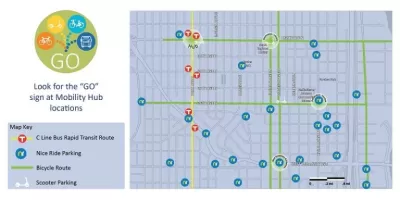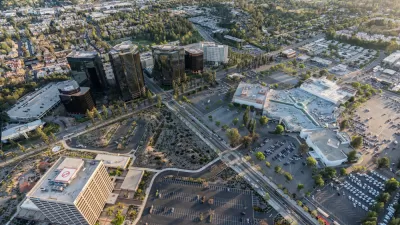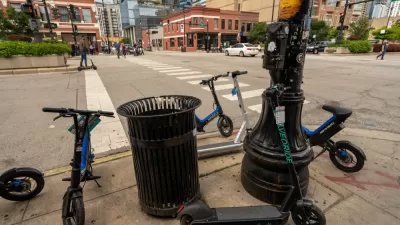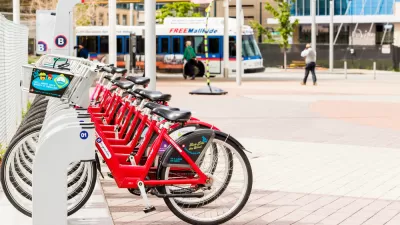Offering multiple, non-automobile options for transportation in one place is the idea behind mobility hubs. The city of Minneapolis is now testing the concept at four locations.

Tim Harlow reports on a new pilot program to launch mobility hubs around the city of Minneapolis. Goals of the program include such lofty aspirations of decreasing driving and carbon emissions while increasing use of alternative transportation modes like transit, walking, and biking.
The new mobility hubs offer several alternative transportation options in one location, according to Harlow: "Each one has a bus stop, a bench and parking for Nice Ride bicycles and scooters that can be checked out by smartphone app."
The city opened four such mobility hubs around north Minneapolis in September, using funding supplied by the Bloomberg Philanthropies' American Cities Climate Challenge.
"As part of the pilot, city staff and representatives from the bike and scooter companies have been on site to show people how to access and use alternative transportation modes, and 'getting people to understand what we are doing here,' [Josh Johnson, the city’s advanced mobility manager,] said. The hubs also feature colorful signs with directions and travel time by mode to nearby destinations."
Hat tip to Katie Pyzyk for sharing news of the mobility hubs pilot program and for providing additional context on the mobility hubs concept.
FULL STORY: Minneapolis pilots mobility hubs combining transit, scooters and bicycles

Maui's Vacation Rental Debate Turns Ugly
Verbal attacks, misinformation campaigns and fistfights plague a high-stakes debate to convert thousands of vacation rentals into long-term housing.

Planetizen Federal Action Tracker
A weekly monitor of how Trump’s orders and actions are impacting planners and planning in America.

In Urban Planning, AI Prompting Could be the New Design Thinking
Creativity has long been key to great urban design. What if we see AI as our new creative partner?

King County Supportive Housing Program Offers Hope for Unhoused Residents
The county is taking a ‘Housing First’ approach that prioritizes getting people into housing, then offering wraparound supportive services.

Researchers Use AI to Get Clearer Picture of US Housing
Analysts are using artificial intelligence to supercharge their research by allowing them to comb through data faster. Though these AI tools can be error prone, they save time and housing researchers are optimistic about the future.

Making Shared Micromobility More Inclusive
Cities and shared mobility system operators can do more to include people with disabilities in planning and operations, per a new report.
Urban Design for Planners 1: Software Tools
This six-course series explores essential urban design concepts using open source software and equips planners with the tools they need to participate fully in the urban design process.
Planning for Universal Design
Learn the tools for implementing Universal Design in planning regulations.
planning NEXT
Appalachian Highlands Housing Partners
Mpact (founded as Rail~Volution)
City of Camden Redevelopment Agency
City of Astoria
City of Portland
City of Laramie





























